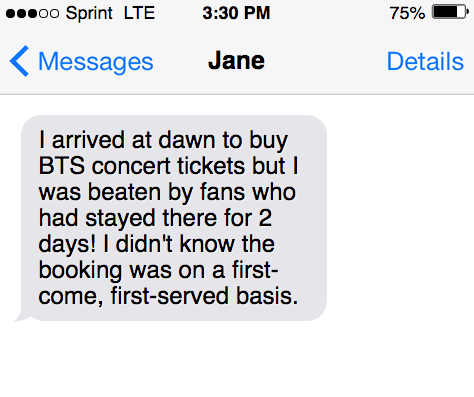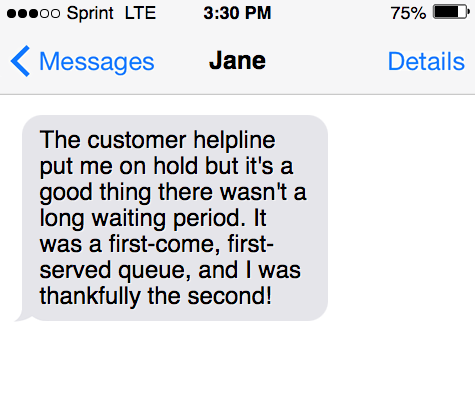What does “first come, first serve” mean? Why is this a common idiom in American English? And where did it originate?
Learn more in this simple grammar guide…
What does “first come first serve” mean?
“First come, first served” is a phrase used to refer to situations or events that require people to show up at the earliest in order to get what they want. It means that people who show up first will be given priority over people who show up later. Depending on the order in which they arrive, they will be allowed to enter a location, for instance.
It is used to decide the order in which they will be eligible to access a particular product, service, etc. It is a phrase that emphasizes the difference in treatment shown towards people based on their arrival. The term signifies that it is fundamental to be there first to receive a particular service. This could refer to various things like event bookings, seating arrangements, complaint resolutions, and purchases of goods, to name a few.

Is it “first come, first serve” or “first come, first served?”
Both versions have been commonly employed throughout history despite grammatical accuracy, allowing only the latter version to exist officially.
The former phrase has slipped into colloquial use and can be seen in ads and posters used by brands even today.
However, “served” is the correct and accurate term usage.
Origins of “first come, first served”
The terminology has its roots in the 1800s when the retail industry tried to motivate consumers to buy items by telling them they will be sold to those who show up first.
This marketing strategy was used to imply urgency at the possibility of goods running out quickly and to incentivize them to make the purchase as soon as possible.
This also ensured that the stores adopted a non-discriminatory practice and treated all consumers equally without favoring anyone.
The same system has even found its way into 21st-century ads where brands are seen urging their consumers to buy products on an “FC FS” basis.

Synonyms for “first come first served”
Here are some alternatives you can use instead of the phrase:
- you snooze, you lose
- be up with the lark
- ahead of schedule
- punctually
- promptly
- a day late and a dollar short
- in good time
- dead on time
- to the second
- too little, too late
- on the dot
- as soon as possible
- spot on time
- at once
Antonyms for “first come, first served”
Here are some phrases that mean the opposite of “first come, first served”:
- belatedly
- better to arrive late than never arrive
- it is never too late to mend
- that is not lost that comes at last
- behind time/schedule
- take one’s time
- drag one’s feet
- dill-dally
- play a waiting game
- waste time
- not hurry
- delay
- be leisurely
- procrastinate
- at the end
Examples of using “first come, first served” in sentences
- “We will be selling the bags on a first-come, first-served basis due to limited availability.”
- “There is no assigned seating, the audience will be allowed to enter on a first-come, first-served system.”
- “We should get there at the earliest. The freebies will be distributed on a first-come, first-served manner.”
- I was told the doctor will be seeing patients on a first come, first served basis, so I did not book an appointment.
How do you say first come, first serve basis?
The phrase is popularly used in its hyphenated form or simply with a comma in between. The general rule of thumb is the hyphenated form can be used where the phrase is succeeded by a noun and acts as an adjective. These are some instances where hyphens can be employed:
- I arrived at dawn to buy BTS concert tickets but I was beaten by fans who had stayed there for 2 days! I didn’t know the booking was on a first-come, first-served basis.
- The customer helpline put me on hold but it’s a good thing there wasn’t a long waiting period. It was a first-come, first-served queue, and I was thankfully the second!
- This 5-star restaurant’s waiting list usually gets filled months before as it’s on a first-come, first-served system. But they were able to squeeze us in since business has slowed down in the pandemic.
- I knew the limited edition toys would run out since they are given strictly on a first-come, first-served allotment. But my baby brother wanted the figurine, so I had to drive to the store.
If you are not actively trying to attach a description to something, the hyphenated form is not needed, like in the examples below.
- I will be putting up a pop-up store at the city fair – it’s strictly first come, first served!
- Photo cards are a hot item in K-pop fandoms. They’re sold for the highest prices to first come, first served.
- Applications here are not processed on merit – it is first come, first served only.
- I had all the documents ready, but the tourist kiosk turned me away as their slots were full. It was first come, first served.
Sources
- What Does First Come First Served Mean? – Writing Explained
- First come, first served Definition & Meaning – Merriam-Webster
- First come, first served – Grammarist
- “first come, first served” vs. “first come, first serve”
- Writing Tip 429: “First Come, First Serve” or “First … – Kris Spisak
- 6 Synonyms & Antonyms for EARLY BIRD – Thesaurus.com
Inside this article
Fact checked:
Content is rigorously reviewed by a team of qualified and experienced fact checkers. Fact checkers review articles for factual accuracy, relevance, and timeliness. Learn more.
Core lessons
Glossary
- Abstract Noun
- Accusative Case
- Anecdote
- Antonym
- Active Sentence
- Adverb
- Adjective
- Allegory
- Alliteration
- Adjective Clause
- Adjective Phrase
- Ampersand
- Anastrophe
- Adverbial Clause
- Appositive Phrase
- Clause
- Compound Adjective
- Complex Sentence
- Compound Words
- Compound Predicate
- Common Noun
- Comparative Adjective
- Comparative and Superlative
- Compound Noun
- Compound Subject
- Compound Sentence
- Copular Verb
- Collective Noun
- Colloquialism
- Conciseness
- Consonance
- Conditional
- Concrete Noun
- Conjunction
- Conjugation
- Conditional Sentence
- Comma Splice
- Correlative Conjunction
- Coordinating Conjunction
- Coordinate Adjective
- Cumulative Adjective
- Dative Case
- Determiner
- Declarative Sentence
- Declarative Statement
- Direct Object Pronoun
- Direct Object
- Diction
- Diphthong
- Dangling Modifier
- Demonstrative Pronoun
- Demonstrative Adjective
- Direct Characterization
- Definite Article
- Doublespeak
- False Dilemma Fallacy
- Future Perfect Progressive
- Future Simple
- Future Perfect Continuous
- Future Perfect
- First Conditional
- Irregular Adjective
- Irregular Verb
- Imperative Sentence
- Indefinite Article
- Intransitive Verb
- Introductory Phrase
- Indefinite Pronoun
- Indirect Characterization
- Interrogative Sentence
- Intensive Pronoun
- Inanimate Object
- Indefinite Tense
- Infinitive Phrase
- Interjection
- Intensifier
- Infinitive
- Indicative Mood
- Participle
- Parallelism
- Prepositional Phrase
- Past Simple Tense
- Past Continuous Tense
- Past Perfect Tense
- Past Progressive Tense
- Present Simple Tense
- Present Perfect Tense
- Personal Pronoun
- Personification
- Persuasive Writing
- Parallel Structure
- Phrasal Verb
- Predicate Adjective
- Predicate Nominative
- Phonetic Language
- Plural Noun
- Punctuation
- Punctuation Marks
- Preposition
- Preposition of Place
- Parts of Speech
- Possessive Adjective
- Possessive Determiner
- Possessive Case
- Possessive Noun
- Proper Adjective
- Proper Noun
- Present Participle
- Prefix
- Predicate



